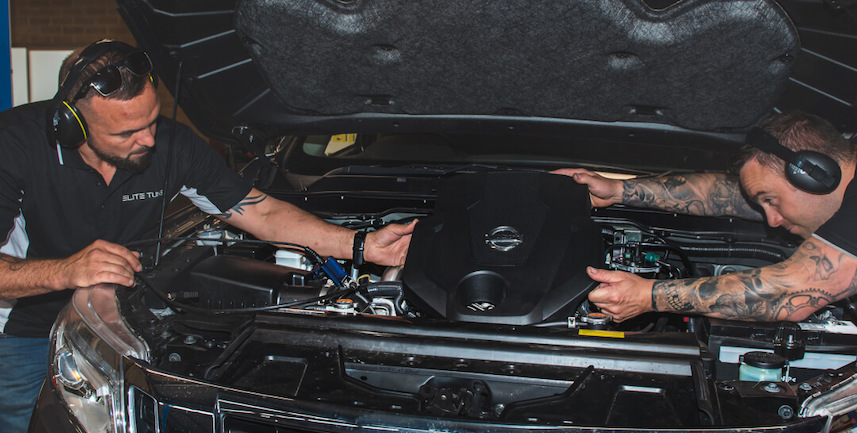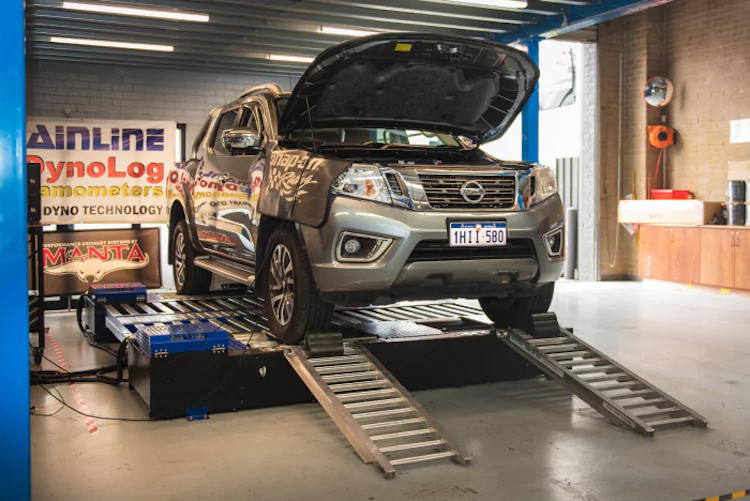Dyno tuning is a service that evaluates your engine’s overall performance and upgrades it according to your driving preferences.
But what exactly does it involve? And why should you dyno tune your car?
For years, I’ve helped hundreds of customers get the most out of their car. In this guide, I’ll show you why it’s so impactful and how it may benefit your vehicle.
Quick Summary
- Dyno tuning is a way to analyse the performance of your engine and fine-tune it to improve its overall function
- It involves a diagnostic tool known as a dynamometer to evaluate engine performance
- This diagnostic testing reveals valuable information about your engine that can be used to optimise its performance, horsepower, and fuel efficiency
- It is one of the best ways to boost your vehicle’s power and overall performance
- Benefits include smoother handling, increased responsiveness, higher towing power, improved fuel economy, increased engine lifespan, and improved acceleration
- It can be customised according to your driving preferences and needs
What Is a Dyno Tune?
My simple answer is that dyno tuning is a way to test your engine’s performance and modify it based on your goals.
A more detailed answer is that it is an advanced diagnostic test that uses a specialised tool (a dynamometer) to reveal valuable information about your engine’s performance. We then use this information to create a customised plan that adjusts various engine settings to optimise its performance and meet your driving needs.
How Does Dyno Tuning Work?
A typical dyno tuning service with us involves a few straightforward steps. These are:
- Testing your vehicle on a dynamometer to assess current performance levels and identify optimisation areas.
- Discussing your driving preferences to tailor a personalised upgrade plan.
- Adjusting air/fuel ratio, spark ignition timing, throttle response, and other aspects to enhance performance and efficiency.
- Improving acceleration, driving feel, boost horsepower, and fuel economy.
- Conducting custom ECU mapping for further optimisation, if applicable.
- Performing a final test run to ensure improvements are successful and provide before and after comparison results.
What Does Dyno Tuning Do?
My favourite part of dyno tuning is the level of customisation it allows. It can be personalised to your driving preferences and needs by adjusting the engine performance, steering, and transmission.
For instance, when I have customers who primarily use their cars for street driving, I can use the tuner to adjust engine parameters that will create a smoother, responsive driving experience. By optimising low-end torque, dyno tuning your car for street driving can ensure smooth acceleration and quick response for stopping and going in city traffic.
Another popular reason is higher towing power and increased torque. If a customer comes in and needs increased towing power and better handling, a dyno tune is one of the first diesel tuning services I recommend.
I also have many customers request better fuel economy for long distance driving. Dyno tuning is a great way to accomplish this. By assessing the fuel-to-air ratio of the engine, we can ensure the engine is receiving the optimal ratio to ensure maximum fuel efficiency.
Whether you need more towing power, want better fuel efficiency, or want a ride that handles predictably and smoothly on rugged off-road trips, dyno tuning can focus on the exact areas you want improved.
What Are the Benefits?
There are many benefits of dyno tuning that can help you optimise your car’s performance and help you get the most out of your vehicle.
Below, I’ve covered what it does and the benefits it can have for your vehicle:
- Improve peak torque
- Improve drivability and smoother handling
- Improve fuel economy
- Reduce turbo lag
- Improve acceleration
- Improve throttle response
- Improve engine lifespan
- Increase towing power
- Minimise or prevent backfire
- Increase horsepower
- Ensure any stock or aftermarket parts are working as they should
FAQs
When should I dyno tune my vehicle?
If your vehicle has been modified, I recommend booking a dyno tune. I’ve seen cars come in with afterstock parts that were not working in conjunction, leading to poor fuel efficiency and wear and tear on engine components.
This will ensure any aftermarket parts are functioning properly so you get the most out of your upgrades.
I also recommend it if you need more torque, acceleration, performance, or horsepower out of your engine. If you plan to do any off-roading or towing, it can be a worthwhile investment.
You may also need a dyno tune if you notice decreased engine performance, such as reduced power, poor fuel efficiency, and slower acceleration. One of the biggest signs is if a tank of petrol isn’t getting you as far as it used to.
How often should I dyno tune my car?
There’s no set answer to how often to dyno tune a car but I generally recommend scheduling one every 12 to 18 months.
When in doubt, contact our team and we’ll be happy to assess if your car would benefit from a one.
We can set up a schedule based on your exact vehicle and your driving and performance goals.
Can I dyno tune my stock car?
I get asked this question often. Yes, you can dyno tune a stock car to achieve higher performance and to identify engine issues. Whether you have a modified or stock vehicle, I recommend considering doing this to unleash your vehicle’s full potential.
How should I prepare my car for dyno tuning?
I love when customers bring their car in for a dyno tune and the oil is changed, fluid levels are optimal, the tyre pressure is good, and there are no engine issues. This ensures the customer will see the most benefits.
If you schedule a dyno tune, here’s what I recommend to prepare:
- Make sure your vehicle is in good working condition and properly maintained
- Check fluid levels
- Make sure the tyres have the proper pressure and are in good condition
- Make sure any engine issues are addressed
When you book with us, we’ll recommend specific advise based on your vehicle’s make, model, and condition and model.
Can dyno tuning save me money in the long run?
I have worked with many customers who saw a significant improvement in fuel efficiency after a dyno tune. This decrease in petrol costs results in immediate savings.
In the long run, a dyno tune can save you money by cutting down on wear and tear, ensuring the engine is running smoothly, and identifying and addressing any engine issues right as early as possible. This can reduce your chance of running into expensive engine issues later on.
How long does dyno tuning take?
Dyno tuning is fairly quick and straightforward. Depending on your driving goals and the make and model of your vehicle, it can usually be completed in several hours.
Conclusion
Dyno tuning is a tailored approach to enhance your vehicle’s engine performance, offering a blend of diagnostic assessment and custom adjustments.
It involves testing with a dynamometer to evaluate and optimise engine efficiency, driving experience, and overall vehicle capabilities according to your specific needs and preferences.
From improving torque, fuel economy, and acceleration to ensuring smoother handling and increased towing power, it addresses a wide range of performance aspects.
Whether you’re aiming for better on-road drivability, off-road resilience, or more efficient long-distance travel, it provides a personalised solution.
It’s also crucial for ensuring aftermarket parts function correctly, enhancing your vehicle’s longevity and potentially saving money on fuel and maintenance in the long run.
For anyone seeking to maximise their vehicle’s performance and reliability, our dyno tuning specialists are here to help.

